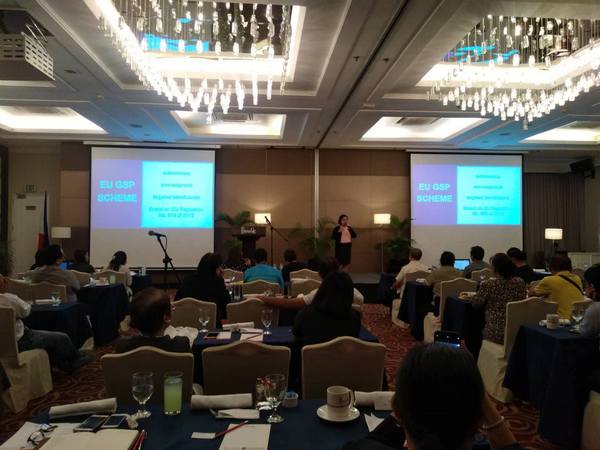
Representatives of the Bureau of Customs, Department of International Trade Relations of the Department of Trade and Industry, and those involved in the export industry discuss the European Union-Generalized Scheme of Preferences (EU-GSP) during the August 8 consultative meeting in Cebu City. CDN FILE PHOTO
EU-GSP REQUIREMENT
The Bureau of International Trade Relations (BITR) of the Department of Trade and Industry (DTI) is encouraging exporters to the European Union (EU) to register with the new Registered Exporter (REX) system which will be implemented by Jan. 1, 2019.
The REX system is the new policy of the European Union-Generalized Scheme of Preferences (EU-GSP) that will require exporters from GSP beneficiary countries such as the Philippines to register as exporters to the EU.
Any exporter that won’t be able to register by Jan. 1, 2019 will be taxed on the exported products whether the products are included in the EU-GSP list or not.
“We are in close coordination with the Bureau of Customs (BOC) on this because we know how important it is for the REX to be in place by Jan. 1, 2019,” said Atty. Ann Claire Cabochan, director of BITR.
A representative from the BOC in Cebu said during the stakeholders consultative meeting on August 8 that the BOC-Manila was still drafting a Customs Memorandum Order (CMO) for the application guidelines for the REX, which the Customs Bureau had been looking to finalize by the end of August.
Step zero
Once the CMO is released, exporters can fill out a form on the pre-application website, customs.ec.europa.eu, then print the completed form and submit this to the Bureau of Customs, which is the sole competent authority that can file applications for the REX.
“This is step zero of the process, since after printing your application, you have to submit it to the Customs. The BOC will be the one to process the application to the EU as a (sole) competent authority,” said Jollan Llaneza, BITR’s trade industry development specialist, during the August 8 consultative meeting.
EU-GSP+
According to the BITR, the EU-GSP+ Scheme is a unilateral and non-reciprocal preferential arrangement that accords duty-free market access to 6,274 products exported to the European Union, which currently has 28 member states.
The Philippines has been a beneficiary of the GSP+ since 2015.
Exporters’ call
However, Cebuano businessmen are calling for an extension on the registration of the REX.
“There is barely enough time. If our applications are not processed, we might be taxed with our exports,” said a concerned businesswoman who refused to be named.
Federico Escalona, the executive director of Philexport Cebu, said in an earlier interview that they were not informed of the policy and that they were also waiting for the CMO.
“I suggest to the affected exporters that they request that the BOC appeal to the EU to reconsider the deadline,” said Escalona.
Options, priority
During the Aug. 8 consultations, Llaneza said that the transition period for the REX could be extended to June 30, 2020.
Cabochan, however, said that although it would be possible that the transition phase would be extended, and that this might be invoked if there would really be a need, the priority would be to have the REX implemented on time.
She said that is why the DTI has been closely coordinating with the BOC on this.
“Although the regulation of the EU has that transition period, which perhaps we can invoke, and it is something that we’re studying so that if there’s really a need, it is not what we have as a first, you know, priority. Our priority is for the REX to be in place. That’s why coordination is being done,” Cabochan said.
FTAs
Aside from sharing updates on various GSP schemes and existing bilateral Free Trade Agreements (FTAs) of the Philippines, the consultations also aimed to solicit inputs from stakeholders on prospective FTAs that the Philippines could pursue with its traditional and non-traditional trading partners such as South Korea, Turkey, Pakistan and Chile.
Gerardo Lacsamana from the DTI said that these countries had been identified as partners that the Philippines could potentially intensify its trade relations with.
The FTA will not only provide zero-tariff on port-to-port trade but can also strengthen influx of investments and labor exchange between the countries.
The Aug. 8 consultations also discussed the European Free Trade Association (EFTA) where the Philippines signed an FTA that entered into force last June 2018. Among the members of the EFTA are Iceland, Liechtenstein, Norway, and Switzerland. / Delta Dyrecka Letigio USJ-R Journalism Intern